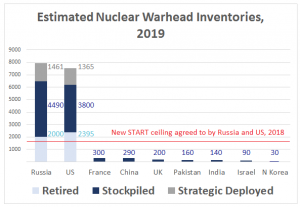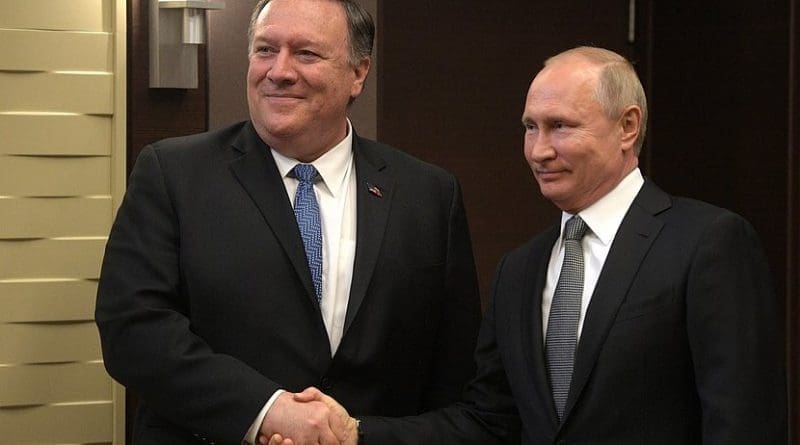Need For Novel Arms-Control Approaches – Analysis
By Richard Weitz and YaleGlobal Online
US Secretary of State Mike Pompeo’s May visit to Sochi, where he met with Russian President Vladimir Putin and Foreign Minister Sergey Lavrov, made clear the two sides’ differences over critical arms-control questions. In particular, neither party offered new proposals to save the Intermediate-Range Nuclear Forces Treaty, or INF. This agreement prohibits Russia and the United States from designing, deploying or testing cruise or ballistic missiles with ranges between 500 and 5500 kilometers. The treaty’s demise is yet the latest evidence that the Cold War arms-control architecture, laboriously built by Moscow and Washington over the past half-century, is losing key pillars.
Signs of the eroding foundation are obvious. The INF’s impending demise follows the earlier collapse of other treaties to limit missile defenses and conventional forces in Europe. Since adoption of the New START agreement in 2010, Moscow and Washington have tried to advance strategic arms control in fundamentally different directions. The Obama administration sought additional cuts in both countries’ strategic delivery vehicles, caps on “non-deployed” strategic warheads and constraints on non-strategic nuclear weapons. In contrast, Russian officials have strived for a more comprehensive framework that would encompass additional countries and weapons systems, such as missile interceptors, space-based weapons and non-nuclear strategic weapons.
The New START provisions allow Moscow and Washington to extend the treaty once by up to five years through presidential agreement, without the need for legislative approval. The Russian government has already proposed a five-year extension for the treaty, which expires in February 2021. In May, Tim Morrison, a senior director on the National Security Council, said that President Donald Trump would likely wait until next year before deciding whether to pursue an extension or seek a more comprehensive arrangement, to include limits on additional countries and weapons systems. At the St. Petersburg International Economic Forum in early June, however, Putin warned that Moscow’s patience regarding a US decision on New START was finite.
While continuing to pursue more comprehensive limits, the Trump administration should agree to the extension to give US defense planners more predictability and transparency, avoid alarming key US and foreign audiences, obviate the need to allocate additional scarce US intelligence resources to replace the lost data flows under the treaty, and provide more time for formal Russian-US talks on encompassing new countries and weapons in future treaties. Though normally most concerned by regional challenges, states having small nuclear arsenals or aspiring to acquire them could exploit the collapse of great power arms control to justify pursuing nuclear weapons. Another important reason to extend New START is that Moscow, having begun its post-Cold War nuclear rearmament earlier, is better positioned to race ahead of the US, at least for a while, in any strategic arms competition without treaty limits. Should New START expire without a replacement, Moscow and Washington would, for the first time in half a century, no longer have a bilateral strategic arms-control treaty in force.

To address the imminent end of the INF Treaty, Moscow and Washington could consider amending New START or negotiating a new treaty to include both INF-range and longer-range missiles under a common ceiling. Within this flexible framework, each country could possess a certain number of ground-launched nuclear-armed missiles, with each having the option of deploying a combination of INF- or longer-range systems, as they deem optimal for their national security.
One reason for the decreased support for nuclear arms control has been what the 2018 US Nuclear Posture Review has called, “The Return of Great Power Competition.” US relations with Russia and China have sharply deteriorated in recent years – due to Moscow’s annexation of Crimea, the China-US trade war and other issues that have diminished interactions on nuclear and other issues.
Fortunately, one can hope that strategic relations between Russia and the United States have reached nadir. In a press conference during his Sochi visit, Pompeo announced that Russian and US officials would begin meeting soon in a dedicated format to discuss arms-control issues. Even before then, in April, Russian Defense Minister Sergey Shoigu acknowledged that US missile defenses could never protect the United States, or its allies, from all missile attacks. The following month, Putin effectively gave his blessing to missile defenses by describing them as strategically stabilizing. Relaxing longstanding Russian demands for limits on US missile-defense capabilities, is imperative since these are politically unacceptable in Washington. Both governments continue to affirm the value of having strong enforcement measures for effective nuclear arms control, though these enhancements must deal with recent accusations of circumvention and the development of novel strategic technologies.
Meanwhile, the Trump administration has come to accept the Russian contention on the need to include additional countries, particularly China, in future arms-control agreements. Concerns regarding the hundreds of Chinese missiles aimed at US allies in Asia already played a significant role in Washington’s February decision to exit the INF Treaty, which applies only to Russia and the United States.
For decades, Chinese officials have routinely excused themselves from nuclear constraints by citing the larger arsenals of Russia and the United States. Yet, China’s expanding capabilities would likely impede realization of negotiated constraints on future Russian and US strategic capabilities. Furthermore, this quantitative focus is less relevant when one considers qualitative issues. The imperative of addressing China’s strategic capabilities within an arms-control framework will almost certainly grow over time as Beijing becomes the most powerful strategic competitor of the United States. Additionally, the mutual accusations of cheating, renewed great power competition, US withdrawal from several legally binding security agreements, as well as political divisions in the United States have made it considerably more difficult to negotiate and ratify legally binding arms-control agreements.
If the strategic arms-control enterprise collapses, reconstructing it will prove tremendously difficult. Russia, China, the United States and other countries are undertaking major nuclear modernization programs. The history of strategic arms control demonstrates that eliminating capabilities is more challenging than averting their development. For these reasons, additional initiatives to increase great power transparency and mutual understanding without formal treaties have become essential. Profitable steps could include the holding of regular strategic stability dialogues among representatives of Russia, China and the United States aimed at developing concrete measures to address the destabilizing potential of new weapons, limiting the proliferation of nuclear and other strategic offensive arms, identifying and averting dangerous operational practices, and developing joint initiatives toward the non-nuclear weapons states, especially at next year’s likely contentious Review Conference of the Nuclear Non-Proliferation Treaty.
Secretary Pompeo’s visit to Sochi made evident both US and Russia’s continued support for critical elements of the existing arms-control structure as well as indications of possible interest in pursuing novel agreements to renew it. At least in the near-term, with the prospects of further cuts being modest, Russian-US arms control for now should focus on reducing risks rather than weapons.
Richard Weitz is senior fellow and director of the Center for Political-Military Analysis at the Hudson Institute. He would like to thank the John D. and Catherine T. MacArthur Foundation for supporting his research and writing on nuclear non-proliferation and security issues.

